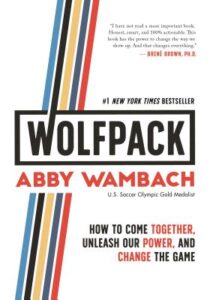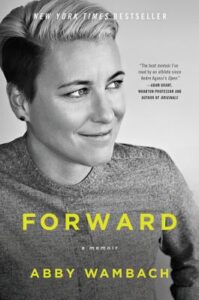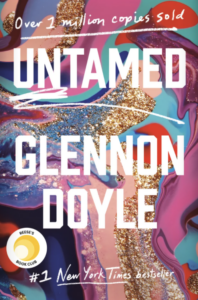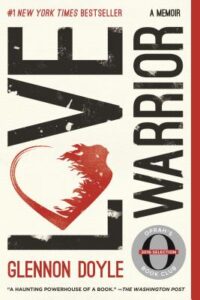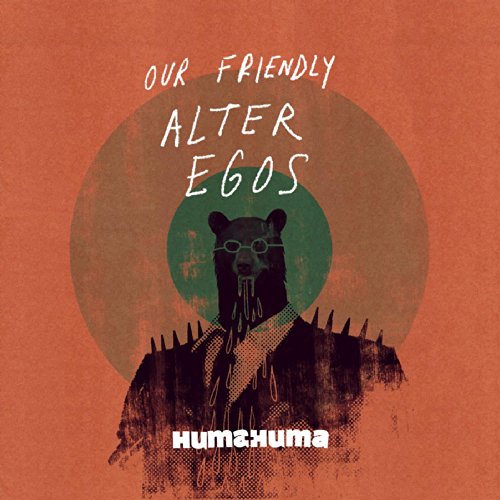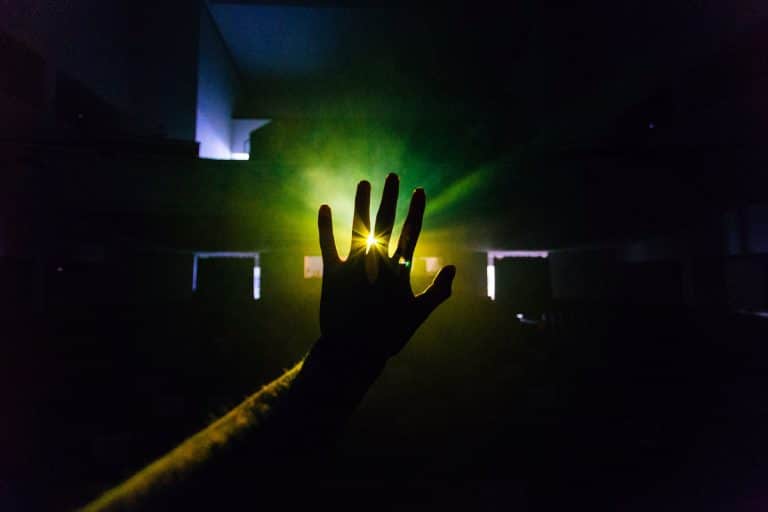Glennon Doyle and Abby Wambach
‘Courage is the presence of fear, and going anyway.’
Glennon Doyle’s book Untamed has been a sensation of 2020 and beyond, and now she’s launched a new podcast titled with words of hers that have become a cultural force: We Can Do Hard Things. Meanwhile her wife, the soccer icon Abby Wambach, has her own bestselling books and is hosting a new tv show – Abby’s Places on ESPN+. Krista spoke with them before they were quite so much in the public eye together, and it’s a window into the passions that brought them here. They sat together in Seattle at the 2018 summit of Women Moving Millions, a consortium of women testing the meaning and boundaries of philanthropy. And courage was the theme of the day.
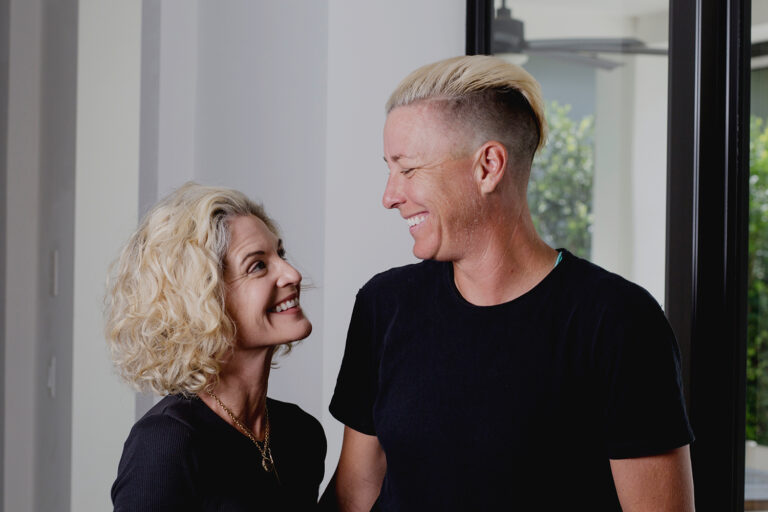
Image by Morgan Jade Hornsby, © All Rights Reserved.
Guests
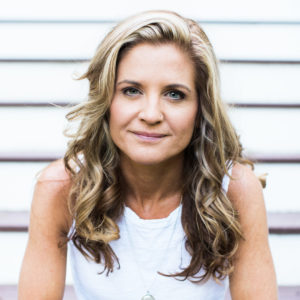
Glennon Doyle is creator of the online community Momastery and founder and president of Together Rising, a nonprofit for women and children in crisis. Her books include Untamed and Love Warrior. She also hosts the podcast, “We Can Do Hard Things.”

Abby Wambach is a two-time Olympic gold medalist, FIFA Women’s World Cup champion, and six-time winner of the U.S. Soccer Athlete of Year Award. She’s written two books: Wolfpack and Forward: A Memoir, and is host of “Abby’s Places” on ESPN+.
Transcript
Krista Tippett, host: Glennon Doyle’s book Untamed has been a sensation of 2020 and beyond, and now she’s launched a new podcast titled with words of hers that have become a cultural force: We Can Do Hard Things. Meanwhile, her wife, the soccer icon Abby Wambach, has her own bestselling books and is hosting a new TV show, “Abby’s Places,” on ESPN+. I had a conversation with the two of them before they were quite so much in the public eye together, and it’s a window into the passions that brought them here. Abby first became a hero to many as an Olympic gold medalist and World Cup champion. Glennon first entered the American imagination as a “Christian mommy blogger,” but she and her online community, Momastery, evolved into a community of giving and activism, with a nonprofit called Together Rising. What follows is a conversation about courage that is both serious and playful as it turns up in their lives apart and together, from addiction to social activism to blended-family parenting.
[music: “Seven League Boots” by Zoë Keating]
Abby Wambach: I mean, Glennon and I talk a lot about this notion of despair. Sometimes she says it to our 10-year-old, who has fallen down in a soccer game. She’ll say, “No time for despair.”
[laughter]
And I’m looking at her, and I’m like, what kind of language are you using?
Glennon Doyle: No, you said, “This is a soccer game, not a poetry reading.”
[laughter]
Wambach: Trying to be nice about it.
Tippett: I’m Krista Tippett, and this is On Being.
[music: “Seven League Boots” by Zoë Keating]
Glennon Doyle has written several bestselling books before Untamed, including Love Warrior. Abby’s latest bestselling book, Wolfpack, emerged from the 2018 commencement speech she gave at Barnard College, which we discuss in this show. We all sat together in Seattle, at the 2018 summit of Women Moving Millions, a consortium of women testing the meaning and boundaries of philanthropy. And courage was the theme of the day.
So Glennon — let me just say one thing. We’re going to leap forward in this conversation and not go over a lot of the stories that, for both of you, that are where a lot of interviews with you happen, because you both have such fascinating stories. Like my teenage daughter would say, “It’s so epic.” You both have epic stories.
But I want to jump into the meat. And I just want to say, if you want to hear these two’s stories, they’ve written gorgeous books. But sometimes the way people will describe your body of work or your career — also, you started out as a blogger; you still are a blogger. Some people will say you’re a master of the “tell-all” form. And really, that’s many forms, and it ranges from the serious to the superficial. So here’s where we’re going to compress a lot of epic history into — Mother’s Day, 2002, you find out you’re pregnant, and that is just this huge turning point, because you decide to have the baby. And you actually marry the father, who you didn’t really know very well at all. And I was so struck by this, that AA — you decided you had to get into recovery, and it was such a revelation. And you wrote somewhere that you thought to yourself, “Why is it that we can only be this honest in little dark basements of churches, one hour a week?”
[laughter]
“What if we could actually be fully human and honest with each other in real life?”
So you started getting up — and again, I’m telling your story, but just to get us to other places — getting up early and writing in that voice that spoke at AA meetings. And one day, you logged onto Facebook, which was kind of new, and noticed that your friends were writing lists called “25 Things About Me,” and you contributed your own. And you definitely added to the genre. [laughs]
Doyle: I don’t know if you remember, but a decade ago, maybe, they were doing this list of “25 Things About Yourself.” And I was freshly sober, I was just dripping with babies — I think I had three under the age of five at that point — and really felt, like a lot of women do at that time, pretty isolated and lonely, overwhelmed and underwhelmed at the same time. Everything was like, too much and not enough. And I logged on, and I didn’t read anyone else’s lists. I just saw, people are writing lists about themselves. So I wrote my list and posted it and walked away and came back to my computer, and there were like 40 emails in my inbox.
Tippett: OK, but can I read number five?
Doyle: Oh God.
Tippett: “I am a recovering alcoholic and bulimic, seven years sober. Sometimes I miss excessive booze and food, in the same indescribable way you can miss someone who abused you and repeatedly left you for dead.” [laughs]
Doyle: Truth, except that my friend Lisa’s number six was, “My favorite snack food is hummus.”
[laughter]
So it was like, “Crap. We’re not doing that here.”
But that was also the moment when I got brave — I mean, I wanted to die, but then, when I got brave enough to start reading those emails, and every single one of them was just a different version of “Oh my God, me too.” “Me too.” “Me too.” And I thought — and they were from people I’d known my whole life, but we’d never really known each other, because we’d been too busy pretending that everything was so perfect and shiny, because for some reason, if we admit or talk to each other about life and relationships and work and all of this being hard, then it seems like some kind of admission of failure — which is so ridiculous, because life and relationships and faith and work and all these are hardest for the people who are doing them right, who are showing up and taking big risks and falling and trying again.
So sometimes it feels like we’re keeping the things from each other that are the very things that are so heavy that we’re supposed to be carrying them with each other. So I mean, when people say “tell-all,” all that means to me is I just don’t have any shame, because what I learned about my recovery, through getting sober, is that it’s not at all the pain of life or the difficulty of life — I still find life extremely difficult — but it’s not that that takes us out of the game. It’s the shame about the difficulty that takes us out of the game.
So I think probably what they mean is that I write about things that maybe other people don’t write about — all the time — but that’s because it’s a spiritual practice for me. The second I start to feel anything that has a hint of shame in it, I always think of that Maya Angelou quote that’s “I am human, so nothing human can be foreign to me.” I get it out, if it’s scary inside and dark; but once I get it out and get light on it, it just shrinks. It’s not so scary anymore. A bunch of people say, “Me too,” and I’m like, “Ah, I’m not bad. I’m just human,” and we get on with it. So I’ve just tried to turn my entire life into one giant AA meeting.
[laughter]
[applause]
Tippett: I actually just want to read this before we move on, because Abby, your story also has different contours of this struggle to own the contradictions — also, in your case, between the fantasy other people have of one’s life and the reality of a life. But Glennon, would it be right to say — Momastery, which is your — is that how you say it?
Doyle: Momastery.
Tippett: That’s how I always said it — I know. And then I hear people saying “muh-mastery” …
Doyle: Oh, that’s my favorite.
Tippett: … and I think they’re not getting it. OK, Momastery —
Doyle: Well, on the Today show, they said, “This is Mom-Mastery: She’s mastering the mom,” which is like, the opposite of everything I stand for.
Tippett: I know.
[laughter]
Doyle: It’s like, noooo. I’m sweating.
Tippett: I know. I was so sure. Was it in 2011, the “Don’t Carpe Diem” post that had 4 million shares and really took off in a new way? And I just want to read this, briefly, because it’s just very beautiful, and a lot of us have been here. “Every evening Craig walks through the door” — that was your husband at the time — ”smiles hopefully, and says, ‘How was your day?’ This question is like a spotlight pointed directly at the chasm between his experience of a ‘day’ and my experience of a ‘day.’ How was my day? I look down at my spaghetti-stained pajama top, unwashed hair, and gorgeous baby on my hip, and I want to say, ‘How was my day? It was a lifetime. It was the best of times and the worst of times.’”
[laughter]
“‘I was both lonely, and never alone; I was simultaneously bored out of my skull and completely overwhelmed. I was saturated with touch, desperate to get the baby off of me, and the second I put her down, I yearned to smell her sweet skin again. This day required more than I’m physically and emotionally capable of, while requiring nothing from my brain. I had thoughts today, ideas, real things to say, and no one to hear them.’”
Doyle: Everyone’s like, “I can’t imagine that she’s divorced now.”
[laughter]
“That must’ve been lovely to live with.”
Tippett: So Abby, you’re a two-time Olympic gold medalist, a Women’s World Cup champion, FIFA World Player of the Year, on Time’s list of 100 Most Influential People, praised by President Obama at the White House. Your book that you published — when did you publish that?
Wambach: 2016.
Tippett: It’s called Forward. And there’s a line in there where you’re describing just two weeks after your retirement, which was just the height of being celebrated. And you have a sentence in there — you’re speaking to yourself — “You are barely brave enough to leave your hotel room.”
Wambach: Yep. You know, when you spend over a decade in a spotlight, in one way or another — our national team gained popularity in 1999, when our team won the World Cup and Brandi Chastain ripped off her jersey. I wasn’t on the team then, but I got there a few years later, won a couple Olympic gold medals, and then finished off my career winning the World Cup in 2015, and I retired a few months later. And so you have certain levels — I had certain levels inside of me — that I could go and train, and I can compartmentalize the fame. I always said that we had a perfect amount of fame on the women’s national team, because it was not like a celebrity, where people were following us with cameras. We were revered and respected, and the downside is, we didn’t get paid enough to deal with it. [laughs] We could’ve gotten paid more, but then, maybe, if we’d gotten paid more, we would’ve been too famous.
But I just remember that time, being so exhausted. A couple weeks after my retirement, I was going on a media tour after the whole thing, and I just felt like, for once in my life — and I was really struggling at the time. I was really deep into my own addiction, and I was really living a hidden life behind that hotel room door, because I was traveling all the time. And I just remember feeling like, if people only knew that actually, I am terrified to walk outside of this hotel room. And somehow I was able to do it. Somehow, I was able to survive. My agent still can’t believe that the amount of traveling that I had to do during that time, that I was able to stand up and — knowing how I was feeling, after I turned in the manuscript of this book, he was like, “I didn’t know you were feeling any of this stuff.”
Tippett: And you’re out there making presentations and being received as a role model and a mentor and a hero.
Wambach: And a hero. For me, that’s what the irony was, is I just was internally feeling so scared and lost. When you have created this identity — I had this identity of myself as a soccer player, and now this identity was being completely shifted, and I didn’t know what the hell to do. And I found myself on a stage, months after my retirement, next to Kobe Bryant and Peyton Manning — they were giving me this Icon Award.
Tippett: Is that ESPN?
Wambach: Yeah, for the ESPYs. And I was so happy to be there, and grateful and everything. And as we turned and walked offstage, I looked at both of those guys, and I thought, wow, all three of us are walking into very different retirements. And at that point —
Tippett: Well, and to be clear, and one of the ways you use to describe that is that they were walking away with fortunes.
Wambach: Of course.
Tippett: And you, your life of hustling was just beginning.
Wambach: Yeah, and I think that that, for me, that’s when the rage started to come to the surface. And — yeah, courage.
Doyle: Courage — it’s always got rage in it.
Wambach: [laughs] Yeah.
[applause]
Tippett: I’m Krista Tippett, and this is On Being, with Glennon Doyle and Abby Wambach.
In the book you wrote, the chapters are all ways people had seen you and categories you’d …
Wambach: Labels, yeah.
Tippett: … sometimes walked into willingly, and sometimes it had been an armor. So it was everything from — or how you’d seen yourself. It would be: “Fraud,” “Tomboy,” “Rebel,” “Teammate,” “Lesbian,” “Manic,” “Depressive,” “Captain,” “Leader,” “Romantic,” “Hero,” “Addict,” “Failure.” And then the last chapter is “Human.” Somewhere, you said you had created yourself. All these categories that were both generated from you and generated externally helped create you, but shut you off from becoming human, fully human.
Wambach: Glennon has said this a lot: we’re all kind of like Russian nesting dolls. And as we get older, we keep putting on all of these costumes. And that’s what I thought, for me, growing up, that’s what I thought I had to do to mature, to age, to get wisdom, is to put on all these different costumes and see which one fit. And I think that now, having gone through a lot of my life — and granted, I’m still fairly young, at 38 — but I realize that the more you can actually take those costumes off and get down to that little, small, immobile Russian nesting doll, that is who you are, your true, true self. That is the humanity of all of us. And we all are in there.
Tippett: This is very random, but I just want to share it, because when I was reading, I was thinking — you ended with “Human,” which seems like the simplest, most elemental thing of all, but is really the work of a lifetime. I was thinking about — there’s this — when I studied theology, Paul Tillich wrote The Courage to Be. And he’s called an existentialist theologian. And I read it when I was older, because I always emphasized, when I thought of that “to be,” that “being.” But the book is actually about the courage it takes. The courage is the work.
So there’s your little theology for today.
[laughter]
OK, so big life-turning: I kept thinking of — what’s the language — inflection point, but really more like earthquake, I think, where your stories converge. And Glennon, you left a marriage. You had just written a book about repairing. [laughs]
Doyle: Yeah. It’s been a doozy, you guys.
Tippett: [laughs] So the two of you met and married — and here’s me, rushing through epic history again — and are now co-parenting your three children together, and actually co-parenting together with their father, in a really modern family.
Doyle: I mean, we don’t like, live in the same house. [laughs] It’s not that modern.
[laughter]
Tippett: You don’t live in the same house, no. [laughs] But you’re working together.
Doyle: Right, yes.
Tippett: Also, there’s really been an evolution of Momastery. Now, which came first, the Compassion Collective or the Love Flash Mobs?
Doyle: Well, the Love Flash Mobs. So that started a long time ago, and the Compassion Collective is really just a group of writers who are my friends, who joined together to help the — with our nonprofit.
Tippett: With the Love Flash Mobs. So talk about what that is and how that developed.
Doyle: Well, I mean, I would say when I became a writer and an artist, and I saw my job as — I think a writer is just, her job is to just pay close attention, just look closely at people. And I think when you look closely at people, you end up loving them. That’s just what happens, over and over again. So I fell in love with this little community that I was speaking to and hearing from every day, online.
And the way it started is one day, I was feeling really grateful, and at the time, I was using my feelings as energies. I think this is something my therapist had suggested. [laughs] And I was feeling all this gratitude. I said, “I’m going to do something with this gratitude.” So I said, “The first email that I open up, if it’s a request, I’m going to grant that request,” because people were always asking me for things.
So I opened my email, and it was a letter, a beautiful letter from this woman who ran a home for teenage homeless mothers, in Pennsylvania. And she said — she was just sharing her heart. She said, “This little girl, 14-year-old girl came to our home last night, holding a baby, and I had to turn her away because we didn’t have the funding for her.” And she was heartbroken. So I said, “Oh my God — that’s it.” So I actually called this woman in the email and said, “I want to pay for that girl to come into your home. What do you need?” And she said, “We need $80,000.”
[laughter]
And I said, “Well, then, we need another plan. That’s going to be a hard credit card charge to hide from my husband.” So I was despondent, because I knew I was supposed to do this; like, this was in the cards.
And that’s when I remembered I had this community of women online, who would feel the exact same way as I did about the situation, and that my job was to be a writer. My job was not to fix everything, but to tell the story of this girl, because I always thought the most revolutionary thing we can do is just introduce people to each other. So I called the woman back, and we stayed up all night, writing this beautiful essay with pictures and all the things, and I said, “We’re going to start something. Tomorrow, I’m going to post this story online, and we’re going to call it a Love Flash Mob,” because at the time, I was obsessed with flash mobs. Do you guys remember those amazing — you remember the one that Oprah did, with the —
Tippett: Yeah, they kind of came and went.
Doyle: Right. So that one has like 79 million views, and I am 78 million of those views …
[laughter]
… because it’s just so gorgeous. It’s like a metaphor for life. It’s like we all just are walking around like zombies, disconnected from each other, and then suddenly, somebody, some fool starts dancing. And then some other fool starts dancing, too, and knows the moves. It’s almost like there’s some kind of choreography that we all know. And then everybody’s dancing.
So the beauty of the Love Flash Mob was, I’m going to open up the giving, but nobody is allowed to give more than $25, because the point was not just to raise the money, but the point was to create a community of givers. And I had to fix — what was the problem? We know we have the feeling; we want to help. But what happens between that feeling and “Just forget it”? And what happens, I think, in that space is confusion. “How much should I give? Will it matter? Who do I have to check with? Oh, I’ll do it later. And so I needed to make it so that — just smoosh that time together so that people didn’t drop off, and also to make somebody for whom $25 is a big deal feel as invested and as important as somebody for whom that was nothing.
So fast-forward seven hours later, we had like $130,000.
[applause]
And that was just the first day. So now, years later, the Compassion Collective — this is a grassroots movement. Love Flash Mobs happen every once in a while. I think we’re just about to hit $15 million, and our average donation is $31. So my journey has been from artist to I guess what you’d say “philanthropy” — this idea that we love people, and we want to help people.
Somewhere in my journey, my team and I were spending just day and night, just emails and helping and helping and pulling people, pulling people. We’d sit down every once in a while — we’d say, what is going on? I believe that people are doing the best they can. Why are all these people suffering? All these people who are working their butts off to put food on the table for their family, and they can’t make ends meet. What’s going on?
One day, I read this quote that said, “You can only pull people out of the river for so long, until you have to look upriver to find out who’s pushing them in.” So that is when I added “activist” to my résumé. Philanthropy is one thing, and pulling people out of the water is one thing, but at some point we have to ask ourselves, what are the institutions and powers that are causing all of these children to not be able to have their heat turned on? What are the institutions that are causing all of these dads to be pulled out to jail for the most minor infractions? What are the institutions and powers-that-be that are causing so many freaking people to be addicted to opioids? We have to go upriver. We’re going to do and/both, all the time. So I just want to spend the rest of my life pulling people out of the river, and also just creating living hell for the people that are pushing them in.
Tippett: And what I also want to just pick up on, just moving back a little bit, is, what you’re doing by saying “you can only give $25” is also helping people not feel paralyzed. Years ago, I interviewed Joan Halifax, a wonderful Buddhist teacher. She talked about how she didn’t like this language of “compassion fatigue.” Although it’s certainly — we all know what she’s talking about. But she said she thought there’s such a thing as “pathological empathy,” because in fact, we get surrounded and inundated and bombarded by images that break our hearts, so many of us, I think. And it’s not that we don’t care, it’s that we’re overwhelmed by how much we care, and we have no idea what we can do to make it better. So that’s also what you’re describing. But we do need a different kind of courage that we don’t possess and that our public life doesn’t nourish right now, to hold that question and walk with it.
Doyle: And to turn heartbreak into action.
Tippett: Yeah. You’ve also gotten involved, and the Compassion Collective got involved, in the children being separated from their families at the border. And you said that — this is so powerful — “Issues like refugee care can seem so overwhelming.” You were saying this to your people, which is a million people or so. “But we’re going to do this thing that I learned when I first got sober. We are just going to do the next right thing, together.” And that’s what we’re not stopping to just say to ourselves and say to each other.
Doyle: Yeah, and I think this idea of compassion fatigue or despair — what I really notice is that the people who complain about despair so much are the people who aren’t doing anything, because what I feel is brokenhearted, a lot of the time, but when I do a little thing, when I just do something, there’s something else that happens. It’s not despair. I don’t know — it’s a little bit of hope. It’s that idea of, we cannot keep the fact that we can’t do everything to keep us from doing something. You do that little thing, and then you feel more awake and alive and connected. So many people, at the time, were saying — you know, this beautiful Mr. Rogers — have you guys seen the documentary?
Tippett: I started watching it on the plane. It’s not a good thing to watch on the plane. You don’t want to cry on the plane.
Doyle: I know. And he said his mother used to say, when tragedy struck, to look for the helpers. And what we say to our kids is, “No, no, that’s not good enough anymore. You have to become the helpers.” We have to be — there’s this side, and there’s this side, sometimes, and we just want to be the first responders. We want to be the people that show up and say, “Here we are. What can we do?”
And there’s something that I see that happens to people who just join in and just give a little bit and just do that next right thing instead of nothing. Whatever despair is, it’s not there with them. It’s a way of keeping hope alive.
Tippett: There’s this language you’ve used, “activism as self-care,” which has a lot of layers to it. And I also want to ask you, Abby, if that rings true for you, that language of activism as self-care.
Wambach: Yeah, I mean, Glennon and I talk a lot about this notion of despair. Sometimes she says it to our 10-year-old who has fallen down in a soccer game. She’ll say, “No time for despair.”
[laughter]
And I’m looking at her, and I’m like, what kind of language are you using?
Doyle: No, you said, “This is a soccer game, not a poetry reading.”
[laughter]
Wambach: Trying to be nice about it.
[music: “Nine Cans” by Huma-Huma]
Tippett: After a short break, more with Abby Wambach and Glennon Doyle.
[music: “Nine Cans” by Huma-Huma]
I’m Krista Tippett, and this is On Being. Today I’m with the Olympic gold medalist and World Cup soccer champion Abby Wambach, together with her wife, the blogger, author, and philanthropist Glennon Doyle. We spoke at the Women Moving Millions 2018 “Power of Courage” summit in Seattle.
I think I want to go to something that might seem unexpected, in this room, because obviously, we could talk about women, but one thing you’ve been talking about recently is raising a boy in this world. And I do think, for so many of us, this realization has come that it doesn’t get better for women if we don’t make better men, and that certain girls — certain kinds of girls, the girls we’re raising in this room — you get a lot of support. I mean, not all girls. But you — would you tell the shower story? [laughs]
Doyle: Oh yeah. You guys, so I went into — because my daughter steals my shampoo all the time, because I buy her cheap shampoo, and I have nice shampoo.
[laughter]
So she steals it. We have this war going on, back and forth with the showers. So I went to her shower one day, and she shares with my son and my other daughter, and I went to her shower, and my girls’ stuff is lined up on one side of the shower, my boy’s stuff is lined up on the other. So of course, my girls’ bottles of shampoo are all pink and purple and slender and tall. I look over at my son’s, and they’re all red, white, and blue and patriotic and very thick and big. And I thought, “This is interesting,” right away.
So I pick up one of my son’s body wash, and you guys, I swear to you, it said this: “Three times stronger than any other soap, this will body-slam” — it was just word after word after militant, dangerous, violent word, till I was like, “Oh God! Are we preparing for war or cleaning ourselves?” And then I pick up the girls’ bottle, and it’s just wispy words that are all disconnected from each other, like “elegant,” “light,” “delicate,” “breezy” — just random things I guess we’re supposed to be, but don’t make any sentences or sense. And I just thought, oh, this is so interesting. And then I thought: before our kids even get out of the shower, we are already telling them how to lose most of their humanity and fit themselves into these little categories of masculinity or femininity — before they even get out of the shower.
And it made me think — just something about seeing that on my boy’s bottles. I became bulimic when I was 10 years old. I’ve been fighting toxic — messages of toxic femininity my entire life. And so when I had these little girls, the second they were born, I was holding them, just like, “You can be anything. Be angry! Go ahead, yell! Rage! I love your anger!” — whatever, just trying to raise these fierce girls. And it hit me, I haven’t been whispering that stuff to my little boy. I haven’t been saying to him, “You can be other things than angry. You can be vulnerable. You can cry. You can be soft. You can be gentle.”
I think, oh God, of course, he’s been learning just as many dehumanizing messages about what it means to be a boy in this world as my girls have. And we wonder why our little boys, that they — it is just as dangerous to tell a little boy that he can only be angry as it is to tell a little girl that she can never be angry. And we wonder why — every message we send to our boys is that in order to be a real man, you have to be really rich, and you have to be famous, and you have to conquer women, and you have to be utterly invulnerable. And then we wonder why our men can only talk about sports and news and weather and nothing else. The poor guys — I mean, we talk about it a lot. It must be so lonely to be a man.
Tippett: And still, it’s shocking that there are still all these messages. And you’ve kind of walked into parenting a boy.
Wambach: Insta-mom. It’s been fun.
Tippett: What? Instant mom. [laughs]
Wambach: Insta-mom. It’s been fun.
Tippett: But has that been a revelation for you, because you walked into the middle of a boy’s life? And he’s a teenager, right?
Wambach: Yeah, and it’s different. When I first met Chase, he was 13 maybe, going on 14. The girls were a little bit younger — 12 and 8, maybe, 11 and 8 years old. And I think that because he was a little bit older, a little bit more baked, in terms of his maturity, you kind of have to process with a boy differently, on some level. He wants to stay a little bit more to himself. He’s studying more for school.
But we talk a ton about how we don’t want him to feel dehumanized, living among a bunch of women. So there’s times where — this is a truth: sometimes I found, when I first got into the family, I found that Glennon was more apt to push the girls to do some of the house chores.
Doyle: I can’t believe you’re saying this. We’re going to have so many talks.
[laughter]
Wambach: And I would be like, “Why doesn’t Chase have to do the dishes?” And she’s like, “You know what? I think you’re right.” So we’ve come down — we’re like, “Chase, you need to do the dishes. Even though you have homework to do, you have to do what has been, historically, a ‘feminine’ job, a role of a woman in the house.” We want to make sure that that’s an equal, shared chore for Chase so that he doesn’t feel left out.
[laughter]
Doyle: I was stunned — stunned at myself.
Tippett: I like that reframing.
I wonder if you would tell the story that you told when you, I believe, gave the commencement speech at Barnard — is that right?
[applause]
That when you retired — and we never got to talk about what it’s like to be retired when you’re 38.
Wambach: It’s OK.
Tippett: OK, next time — that your sponsor, Gatorade, surprised you at a meeting with a plan for your send-off commercial and that the message was “Forget me,” which made you really happy.
Wambach: Yeah, I went in there — and I’ve done work with Gatorade for my whole career. I’ve been a Gatorade athlete, at the time, for I guess it was 15 years. So when I walked in the offices, and they sat me down, and they showed me that they were going to make this commercial that was going to be my commercial, my retirement commercial — well, first of all, I was very honored. It feels like rarified air, to be the athlete for a campaign for Gatorade. And then the messaging that they wanted to get across to the consumer was this “forget me” idea.
And for me — I know that sounds so bizarre, because most athletes are egomaniacs and crazy into themselves, but I really feel deeply that the legacy I wanted to leave is making sure that I am leaving the sport better than I found it. And so often — you know, I hold the record for most goals scored, for any person on the planet.
[applause]
Tippett: Of any gender.
Doyle: She’s humble. She’s humble, you guys.
Wambach: And so people ask me all the time — there’s actually this woman from Canada, Christine Sinclair, that …
[applause]
… she will likely break my record within the next 12 months. And don’t say anything, Glennon, because she’s like, “No, I don’t want her to break your record!”
But the reality and the truth is — and I really do believe this — that especially women, we are here to keep pushing each other. And if somebody breaks my record, that means the game is better. That means the game is growing. That means other people are achieving greater, bigger heights than me. And that is the kind of legacy that I can actually wrap my mind around. And you can’t find success unless you are willing to let it go when it’s over.
[applause]
Tippett: I’m Krista Tippett, and this is On Being. Indeed, Christine Sinclair did break Abby Wambach’s record after this conversation I had with her and her wife, Glennon Doyle.
And I feel like, coming from really different directions, the two of you use this really kindred language. I mean, you talk about that we need to “champion” each other. And Glennon, you use the language of “sistering” each other.
Doyle: Well, “sistering” is just the best word ever. OK, so …
Wambach: I love this story.
Doyle: You know carpentry? It’s just boards and nails, carpentry, right? Jesus was one.
[laughter]
So there’s this thing happens in carpentry, where the mainstay of a building is a joist. And so every once in a while, the joist starts to weaken because there’s a load put on top of it that’s too heavy. So when that happens, they say, “OK, bring some extra boards.” And they put an extra board to the right of the weakening joist, and if that doesn’t make it strong enough, then they bring another board, and they put it to the left of the weakened joist. And with an extra board to the right and an extra board to the left, the joist becomes strong enough to withhold any load. And do you know what that carpentry system is called? “Sistering.” I mean, it’s like the guy carpenters were like, “Oh, we can’t name this ‘brothering.’ That’s too much intimacy there.”
[laughter]
“So that looks more like what the ladies would do.”
But it’s just the most beautiful, to me, example of how women support each other, and for life, because sometimes the load on us just gets too heavy to carry by ourselves. And the mistake we make when that happens is, we think that we’ve done something wrong. We think we’ve made a mistake, we’ve gone wrong somewhere, because it can’t be this heavy.
But if we never had to ask for help because we couldn’t carry the load anymore, then we would miss out on the best part of life, which is just sistering and being sistered. Or champion each other. Go get the ball, score the goal.
Wambach: Same thing. Same, same.
Doyle: Yes.
[laughter]
Tippett: And I’m using the language of, we need to “accompany” each other, which is just another, in this universe of words, but also realizing that that’s also tricky, when we — saying “Forget me” is very complex, and you also have a story about coaching your 10-year-old daughter’s soccer team and somebody asking you, “So you retired. What did you retire from?” [laughs]
Doyle: Halfway through the season, you guys.
Wambach: So it was halfway through the season, and we were warming up for a game, and I was laying off some of the soccer balls so that they could shoot. And I had just mentioned, “Oh, when I retired …” And one of the girls said, “Oh, what did you retire from?” And I said, “Soccer.” She said, “Oh! Who did you play for?” And I said, “I played for the United States of America.” And she goes, “Oh, does that mean you know who Alex Morgan is?”
[laughter]
So watch out for what you ask for, because they forgot me.
[laughter]
Tippett: I love that, and I feel that this — especially in this moment we inhabit, this cross-generational friendship is so important; that we’ve given our children a very complicated world, and they don’t want to be told what to do, but they want to be accompanied. And it is also about us relinquishing power we have and the knowledge — the unbecoming, because that’s beautiful and hard.
Doyle: We tell our kids all the time — I think one of the amazing things about parenting is, you want to teach your kids how to be human among humans, and so it makes you stop and consider how to be a human among humans. [laughs] You have to stop and think about it for the first time.
And so one of the challenges I’ve found so much in parenting is the same challenge that I find in my actual life, which is just letting them have their pain, because like you said, these things, we talk about them, but they’re hard. And we feel them. And one of the most important parts of my sobriety and in activism, and why I call activism self-care, is just giving myself permission to feel the things. And so Abby will tell you, I mean, I feel really — I allow myself to feel [laughs] a lot. I allow feelings to take me to bed for 24 hours, quite often. And I think that there is some kind of crazy power in that.
In my commitment to sobriety, each day, just being committed to dealing with life on its own terms, and my own feelings on its own terms, and not rushing myself and distracting myself — and sometimes that means I go down hard. And then there’s something that happens after that that’s really beautiful, 100 percent of the time. So we say, all the time, with our kids, everything’s a pattern. It’s first the pain, then the waiting, then the rising — over and over and over again. Pain, waiting, rising. And when we skip the pain, we just never get to this rising.
Tippett: And courage is borne of that and giving in to that.
Doyle: And courage is borne of that, just surrendering to the process. And so, especially being a parent who’s raised in the — you know, we got this parenting memo that everything would be OK if we just never let anything bad ever happen to our children, ever, as long as — they gave us the babies and were like, “Take her home and just never let being human happen to this child. Don’t let anyone ever frown at her, don’t let her lose anything, don’t let a drop of rain fall onto her head, and then everything will be fine.” Our parents got the memo: “Just take her home and then go drink Tab and smoke cigarettes and have Bloody Marys.”
[laughter]
Tippett: [laughs] Right, like you did throughout the pregnancy.
Doyle: Right. So they got the awesome memo, and ours sucked.
[laughter]
So anyway, that’s what I figured out. It took me till my kids were 10 to realize that that parenting memo was complete b.s. and that when we don’t let our kids fail, and we don’t let our kids feel, they don’t learn how to become human. So one of my greatest challenges in my personal life and in my parenting is just to look at my kids and say, “I’m not going to protect you from this. I’m going to let you fail here. I’m going to let you feel that. Yes, yes — life is that hard. It is that hard to be human, and I’m not going to grab that from you.”
We talk about — we’re trying to raise these kids who don’t think they have to be fire avoiders, who don’t have to constantly avoid the fires of their lives and of their relationships and of the world, because they learn over and over again that they can walk through the fires, because they’re fireproof. That’s what we learn, when we keep showing up for hard things and we keep making it through: that we don’t have to skip the hard things anymore, because we somehow always survive and end up stronger.
Tippett: I want to ask you, in closing, just each of you, just for a moment to reflect on what makes you despair right now and where you’re finding hope.
Doyle: You want me to go first?
Wambach: Well, sure. I mean, I don’t care.
Doyle: No, go ahead. I just didn’t know if you were …
Wambach: I think that what makes me feel despair is just how lost it feels like parts of our government feel to me. And what makes me feel hopeful is that I know that it won’t last forever.
Doyle: Well, I mean, I think, for me, the despair and the hope come in the exact same place. I keep hearing all over the place, “Oh my God, what’s going on right now? Everybody’s suddenly so racist, and everybody’s so homophobic, and everybody’s so —” and OK, but like, the people have always been like that. [laughs] It’s just that now we can see it.
Wambach: And people are talking about it.
Doyle: Right, now it’s at the surface. So when you ask people who actually have been affected by racism their whole life, when you ask people of color, they’re not super surprised right now.
[laughter]
They’re like, “OK, so thanks, everybody.”
Wambach: “Welcome.” [laughs]
Doyle: “You just got to the party.” Right? So that’s why I think the despair and the hope are in the exact same place. And I think about this all the time, because we give destruction — we’re too scared of it. We’re too scared of apocalypse. Like, who wants things to stay the same? Not me. You know? We get so scared of the ends of the world.
As women — the first story I ever learned about God and being a woman was, “OK, so everything was great, and God put two people in a garden, and — no, no, first, one person in a garden. That was Adam. And then he gave birth to Eve.”
OK, so we’re supposed to take that one on the chin, first. OK, all right. So men give birth to women. OK, it’s not what I’ve seen in my life, but — got it.
“And then everything was fine until the woman wanted something, and then she went for it, and then all hell broke loose, and everything was terrible forever. Thank you for joining us. Go in peace.”
[laughter]
And then we’re like, why are women so confused about what they want, and food? I don’t know, she just wanted an apple. What if she wanted a freaking pizza?
And what I think about over and over again is, what that story does, what every story we learn about being a woman does is make us start to fear what we desire. Women have to fear what we desire. What women want is bad. What women want is scary, which makes us doubt ourselves over and over again. “What do we want? We don’t know what we want; we don’t even know where we want to go to dinner. Who knows? We don’t know.”
But what I find, talking to women all over the world, is that what women want is so good that if women started to go for it, power structures would tumble. So doesn’t it make sense that every single power structure would have to make women doubt what they desire? Because if women went for what they desired, the world would crumble.
Wambach: That’s good.
Doyle: And other worlds, based on equality and justice and love and peace would have to be rebuilt in their place. So what I want women to do is just go for the apple and let it burn.
[laughter]
[applause]
Tippett: [laughs] Glennon Doyle and Abby Wambach, thank you so much. And thank you for having us.
[applause]
[music: “Noizy Birdz” by Raphael Treza]
Tippett: Glennon Doyle is creator of the online community Momastery and founder and president of Together Rising, a nonprofit for women and children in crisis. Her books include Untamed and Love Warrior. She hosts the podcast We Can Do Hard Things.
Abby Wambach is a two-time Olympic gold medalist, FIFA Women’s World Cup champion, and six-time winner of the U.S. Soccer Athlete of Year Award. She’s written two books: Wolfpack and Forward: A Memoir, and she’s host of “Abby’s Places,” on ESPN+.
[music: “Noizy Birdz” by Raphael Treza]
The On Being Project is located on Dakota land. Our lovely theme music is provided and composed by Zoë Keating. And the last voice that you hear singing at the end of our show is Cameron Kinghorn.
On Being is an independent, nonprofit production of The On Being Project. It is distributed to public radio stations by WNYC Studios. I created this show at American Public Media.
Our funding partners include:
The Fetzer Institute, helping to build the spiritual foundation for a loving world. Find them at fetzer.org;
Kalliopeia Foundation, dedicated to reconnecting ecology, culture, and spirituality, supporting organizations and initiatives that uphold a sacred relationship with life on Earth. Learn more at kalliopeia.org;
The Osprey Foundation, a catalyst for empowered, healthy, and fulfilled lives;
The Lilly Endowment, an Indianapolis-based, private family foundation dedicated to its founders’ interests in religion, community development, and education;
And the Ford Foundation, working to strengthen democratic values, reduce poverty and injustice, promote international cooperation, and advance human achievement worldwide.
Books & Music
Recommended Reading
The On Being Project is an affiliate partner of Bookshop.org and Amazon.com. Any earnings we receive through these affiliate partnerships go into directly supporting The On Being Project.





